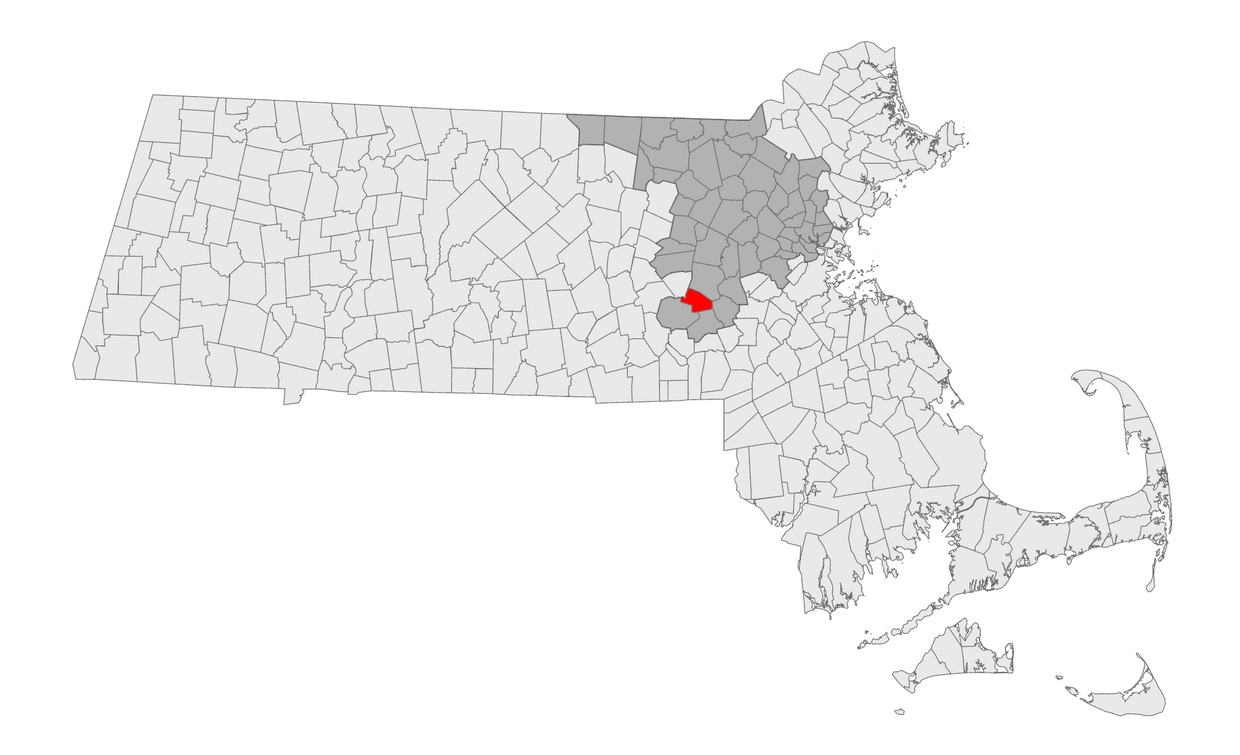Ashland Overview
Ashland is a town in Middlesex County, Massachusetts, in the Eastern part of the state. They have a population of 1,505 people and an area of 12.3 square miles. Climate hazards present in Ashland include extreme temperatures, severe weather, drought, and inland flooding.
Ashland Core Team
The MVP 2.0 Core team is a group of municipal staff and Community Liaisons who work together to identify local climate resilience priorities and implement a project that supports those priorities.
Ashland's Community Liaisons include representation from:
- Longtime residents
- AREA (Ashland Residents for Equity and Justice)
- Retired individuals
- Ashland Indians group
- Ashland's DEI taskforce
- Students at Ashland High School
Sudbury's Core Team municipal representation includes:
- Communications Coordinator
- Town Engineer who lead MVP 1.0
- Social worker for town
- Sustainability Project Manager
Ashland's Community Resilience Priorities
Community resilience priorities are practical actions created during the MVP 2.0 Planning Grant process. They were shaped through community input, thoughtful discussion about changing local needs, and feedback from Environmental Justice groups and other community members.
Ashland, in partnership with their Core Team, identified the following priorities through the MVP 2.0 process.
| Community Resilience Priorities | Potential Actions | ||
|---|---|---|---|
| Priority 1: Explore options to expand public transit services in transit-isolated areas by collaborating with the MWRTA and assessing the feasibility of adding a bus shuttle. | Potential Actions: Adding more bus stops, increasing frequency of buses, and conducting a feasibility study for a bus shuttle. | ||
| Priority 2: Increase accessibility of healthy and affordable food, particularly for neighborhoods without a grocery store. | Potential Actions: Introducing a mobile food market, working with convenience stores to offer healthy foods and accept SNAP, creating a food delivery (including an e-cargo bike delivery program), and a food recovery program. | ||
| Priority 3: Increase access to affordable energy efficient heating and cooling systems, particularly in the hottest neighborhoods. | Potential Actions: Creating a building rehab program with a specific focus on retrofits for rental properties and informational campaigns about existing energy efficiency programs. | ||
| Priority 4: Increase access to housing assistance for lower income residents. | Potential Actions: Hiring a regional housing coordinator, providing financial assistance, and changing zoning to allow for more construction of affordable housing properties. | ||
| Priority 5: Provide access to clean drinking water in public spaces. | Potential Actions: Installing water fountains and ensuring water is turned on. | ||
| Priority 6: Expand access to affordable physical and mental health services in flood resilient areas. | Potential Actions: Opening a community health center, a school based health center, and an urgent care. | ||
| Priority 7: Develop a sheltering and transportation plan for vulnerable populations during hazardous events. | Potential Actions: Developing a special needs registry for residents with disabilities, chronic conditions, or special needs; identifying shelter locations outside of flood plains; and working with emergency responders to develop these plans. | ||
| Priority 8: Reduce flood risk near Ashland waterways through policies, projects, and initiatives that increase flood resilience. | Potential Actions: Regulatory changes, an education and home retrofit program with homeowners and renters, and implementing nature based solutions. | ||
| Priority 9: Expand bike infrastructure (bike lanes, bike paths, etc.), prioritizing neighborhoods that serve the priority populations. | Potential Actions: Climate-resilience check list for the upcoming OSRP update, partnering with community organizations to organize residents around invasives management, trail clearing, etc. | ||
| Priority 10: Institutionalize new ways for the Town of Ashland to engage with community members, including improving language access, piloting new communication platforms, and building relationships with community organizations and residents. | Potential Actions: Developing a community resilience communications strategy, developing a language access plan, building relationships with new community partners, institutionalizing the Core Team as a new town committee, creating one central call number for Ashland, and developing an app for the Town of Ashland. | ||
Ashland's Seed Project: Resilient Spaces for a Resilient Ashland
Ashland received funding to implement a Seed Project that addresses one or more of their climate resilience priorities.
Ashland aimed to reduce heat-related illnesses and provide access to healthy and affordable foods through building resilience of their Community Center and strengthen partnerships with local farms. Ashland plans on installing a water fountain to help with hydration on hot days as well as a refrigerated shed that can help to expand the capacity of the food pantry to provide fresh food, which is located in the Community Center. Additionally, they plan on building partnerships with local farms that can provide food to the pantry as well as to lead workshops that educate Ashland residents on farming. The project also includes purchasing charging stations for the Community Center, for residents to charge devices in the case of power outages at home.
The activities of this project include:
- Assess the Community Center through the RMAT Climate Resilience Design Standards.
- Purchase and install water fountain into Community Center.
- Reach out to local farms.
- Purchase and install refrigerated shed and charging stations into Community Center.
- Publicize food pantry to residents.
- Collaborate with local farms to conduct educational workshops on gardening.
Ashland's Action Grant Projects
The MVP Action Grant provides funding to communities that want to take important steps to prepare for climate change, such as dealing with extreme weather, flooding, rising sea levels, and extreme heat.
Building Relationships and Resilience with MetroWest Environmental Justice Neighborhoods FY22
(Partnered with Natick and Framingham) Municipal staff completed an equity training and collaborated with community liaisons to develop a better understanding of regional climate equity and resilience needs. The project culminated with a series of Community Climate Conversations, in which municipal staff and residents from priority neighborhoods worked together to share findings, discuss a path forward, and update climate-related plans.











